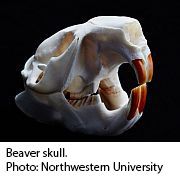- Pandemic Had Only Minor Effect on Young Kids’ Development
- A-Fib More Common in Middle-Aged Folk Than Thought
- What Folks Consider ‘Old Age’ Is Getting Older
- U.S. Measles Cases Reach 125, Surpassing Recent Peak in 2022
- WHO Chief Sounds Alarm on Bird Flu Circulating in U.S. Cattle
- EPA Designates Two ‘Forever Chemicals’ as Hazardous
- Many Parents Cook Special Meals for Little Picky Eaters: Poll
- Relationship With Partner Affects Outcomes for Breast Cancer Survivors
- Parents, Coaches: Help Young Athletes Avoid Summer Heat Hazards
- Hoping to Conceive? Experts Offer Tips to Better Female Fertility
Beavers Offer Tips on Cavity Prevention


Beavers don’t need to brush or floss because the presence of iron in their tooth enamel gives them superior protection against tooth decay, researchers report.
Beavers’ enamel is harder and more resistant to acid than regular enamel, including enamel treated with fluoride, according to the Northwestern University researchers.
They said their imaging study of tooth enamel at the nanoscale could help improve understanding of cavities in people, and perhaps lead to earlier detection of tooth decay and improved fluoride treatments.
“A beaver’s teeth are chemically different from our teeth, not structurally different,” study author Derk Joester, an associate professor of materials science and engineering, said in a university news release.
“Biology has shown us a way to improve on our enamel,” he added.
The study was published Feb. 13 in the journal Science.
Despite advances made with fluoride treatments, tooth decay is one of the most common chronic diseases and a major public health problem, the researchers noted.
Nearly 100 percent of adults and 60 percent to 90 percent of children worldwide have or have had cavities, according to the World Health Organization.
More information
The U.S. National Library of Medicine has more about tooth decay.
Source: HealthDay
Copyright © 2024 HealthDay. All rights reserved.









